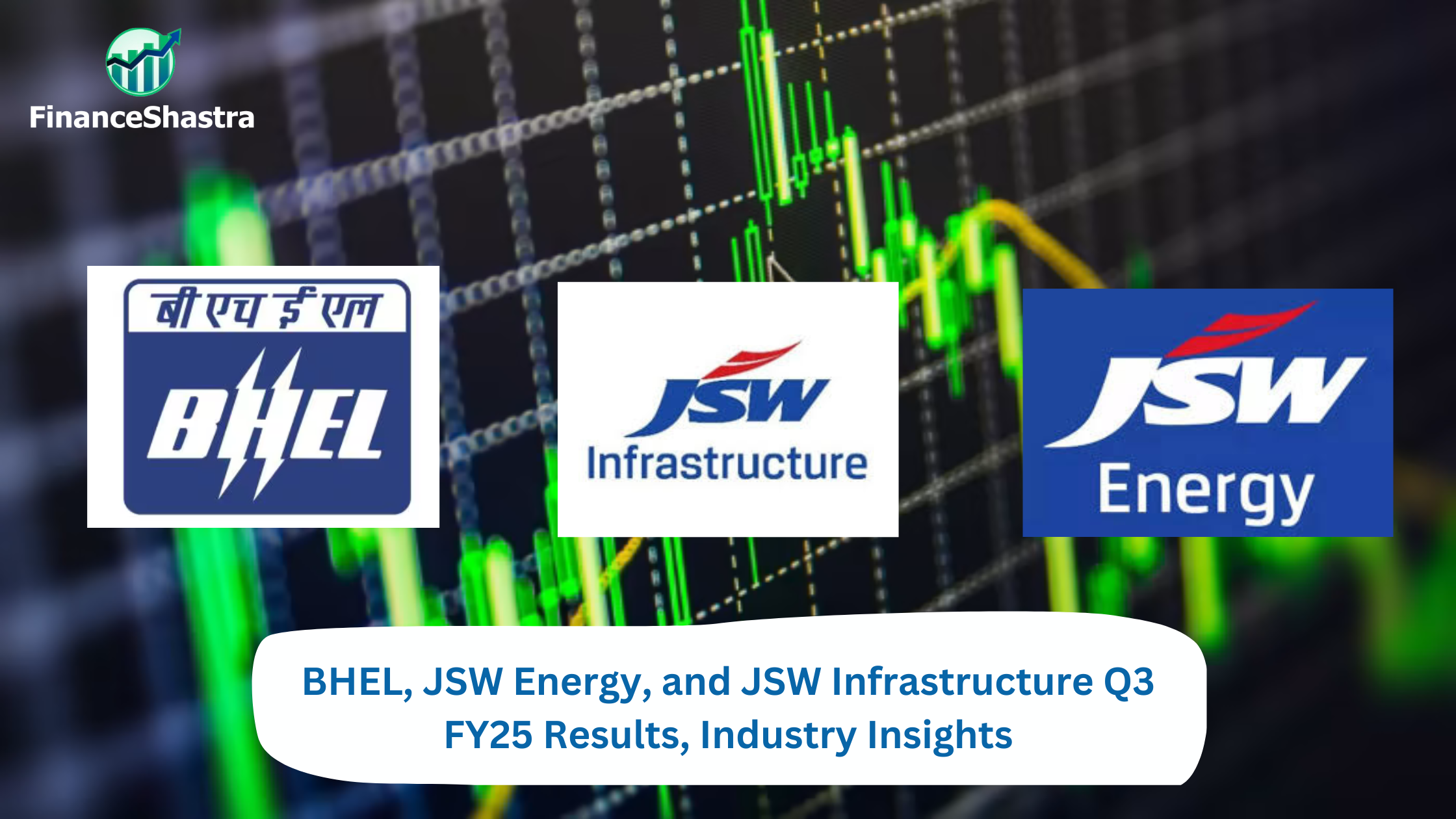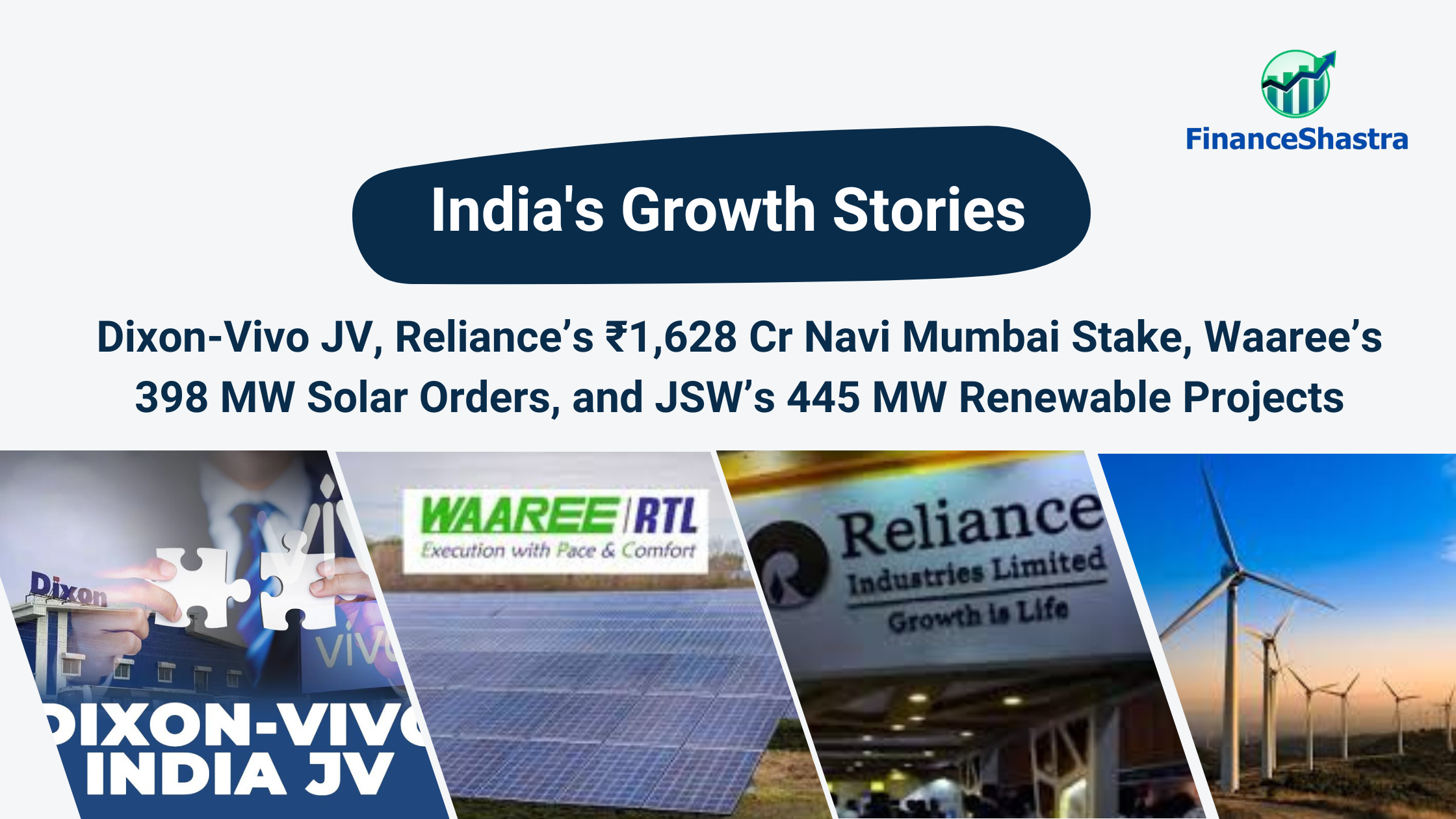BHEL,JSW Energy, and JSW Infrastructure Q3 FY25 Results, Industry Insights
Bharat Heavy Electricals Ltd: Overview
Bharat Heavy Electricals Ltd. (BHEL) is one of India’s largest public sector engineering and manufacturing companies, primarily focused on power generation and transmission equipment. Established in 1964, BHEL has played a crucial role in the development of India’s power and industrial infrastructure. The company is headquartered in New Delhi and operates through numerous manufacturing plants, regional offices, and service centers across India and globally. BHEL is a dominant player in the power generation equipment sector, where it manufactures a wide range of products like Thermal Power Plants, Hydroelectric Power Plants, and Gas based Power Plants. The company also offers solutions for substations, transmission lines, and distribution systems, which are critical components for maintaining power grid stability. BHEL has been diversifying its product offerings and has a growing presence in the defense sector. The company manufactures radar systems, communication equipment, and other defense electronics, contributing to India’s defense capabilities. It also offers equipment and systems for aerospace applications. BHEL has a strong presence both in India and internationally, with significant exports to countries in Asia, the Middle East, Africa, and Latin America. The company has worked on major projects in countries like Algeria, Egypt, Sri Lanka, and Nepal.
Latest Stock News
In the Power Segment, BHEL emerged as the successful bidder for the main plant package of the 3×800 MW Telangana Stage-II supercritical thermal power plants. The company also received a Limited Notice to Proceed (LNTP) from NTPC Ltd. to begin basic engineering. In the Industry Segment, BHEL secured an order for the supply of around 800 kV, 6000 MW Khavda-Nagpur LCC HVDC Terminal Stations, along with AC transmission systems at Khavda and Nagpur, in collaboration with Hitachi Energy India Ltd. For sector-wise order receipts up to Q3 FY25, the Power Sector received Rs. 39,464 Cr, the Industry Sector received Rs. 8,328 Cr, and Exports garnered Rs. 154 Cr. Other key orders include an EPC order for the 765 kV Air Insulated Substation Package, several substation extension orders for 400 kV/765 kV ratings, and the supply of transformers for various transmission companies. Additionally, BHEL secured orders for supplying and supervising the installation and commissioning (E&C) of a 1x 80 MW STG for a chemical manufacturing company, and supplying 689 traction motors and 27 sets of traction electrics for the DETC project from Indian Railways. The company also received a development order for high-power Li-ion cells from the Vikram Sarabhai Space Centre. In the Export Market, BHEL secured an order for the supply and supervision of a 95 MW generator for Russia and an order for safety valves for a project in Costa Rica, marking its entry into the 91st country. BHEL also successfully completed the Harbour Acceptance Trials (HATs) for the first upgraded SRGM onboard INS Nilgiri. Furthermore, six BHEL units/divisions were recognized in various categories at the prestigious CII EXIM Bank Award for Business Excellence 2024.
Q3 FY25 Earnings
- Revenue of ₹7277 crore in Q3 FY25 up by 32.2% YoY from ₹5504 crore in Q3 FY24.
- EBITDA of ₹304 crore in this quarter at a margin of 4% compared to 4% in Q3 FY24.
- Profit of ₹135 crore in this quarter compared to a ₹60 crore profit in Q3 FY24.
JSW Energy Ltd: Overview
JSW Energy Ltd is a part of the JSW Group, is one of India’s leading private-sector power generation companies. The company is engaged in the business of power generation, transmission, and distribution, focusing on renewable energy, thermal energy, and hydroelectric power. Established in 1994, JSW Energy has played a significant role in the country’s energy sector, contributing to both the conventional and renewable energy segments. JSW Energy operates a significant portfolio of thermal power plants across India. These plants primarily use coal and gas as their fuel sources. The company has thermal power plants in states like Maharashtra, Tamil Nadu, and others, with a total installed capacity that has made it one of the major players in the Indian thermal power sector. The thermal plants play a crucial role in meeting India’s increasing energy demands, particularly in industrial and urban sectors. The company has made significant investments in solar power projects and has been scaling up its renewable energy capacity in line with the Indian government’s renewable energy targets. This segment is becoming increasingly important to JSW Energy as it aligns with global trends toward sustainability and reducing carbon emissions. The company’s hydroelectric plants help in balancing the grid by providing consistent and reliable power, especially during peak demand periods. The energy sector in India is undergoing a major transformation. The country is one of the largest consumers of energy in the world, with an increasing demand for both conventional and renewable energy sources. The Indian government has set ambitious goals for renewable energy capacity, aiming for 500 GW of non-fossil fuel-based energy by 2030, which creates opportunities for companies like JSW Energy to grow its renewable energy portfolio.
Latest Stock News
On December 27, 2024, O2 Power signed a definitive agreement to acquire a 4,696 MW renewable energy (RE) platform, marking one of the largest RE transactions in the sector. The deal was valued at an enterprise value of ₹12,468 crores after adjusting for net current assets. Additionally, O2 Power completed the acquisition of 125 MW of wind projects from Hetero Labs and Hetero Drugs Ltd. on January 10, 2025. The company’s net generation of energy increased by 10% YoY, reaching 6.8 billion units and is driven by wind capacity additions, incremental contributions from Utkal Unit 1, and higher generation from hydro plants. As of now, the total locked-in capacity stands at 28.3 GW. During the third quarter, 377 MW of wind capacity was commissioned, bringing the total installed capacity to 8.1 GW, with 872 MW added in the first nine months of the fiscal year. In the utility-scale segment, O2 Power received a Letter of Award (LoA) for 400 MW of ISTS-connected solar capacities from NTPC in December 2024. Wind generation reached 639 million units, a 38% increase YoY, thanks to the capacity additions. Additionally, total hydro generation rose by 14% YoY to 723 million units due to improved hydrology.
Q3 FY25 Earnings
- Revenue of ₹2439 crore in Q3 FY25 down by 4.09% YoY from ₹2543 crore in Q3 FY24.
- EBITDA of ₹914 crore in this quarter at a margin of 37% compared to 44% in Q3 FY24.
- Profit of ₹157 crore in this quarter compared to a ₹232 crore profit in Q3 FY24.
JSW Infrastructure Ltd: Overview
JSW Infrastructure Ltd is a part of the JSW Group, is one of India’s leading private-sector players in the infrastructure development sector, with a focus on ports, logistics, and related services. Established with the aim of supporting India’s growth and fostering trade and commerce, JSW Infrastructure has expanded its footprint across various parts of India and globally. The company plays a significant role in facilitating the smooth movement of goods, especially in the maritime, logistics, and port infrastructure domains. The company operates multipurpose cargo terminals, bulk terminals, and specialized terminals for handling various types of cargo such as coal, iron ore, liquid cargo, containers, and general cargo. The company has a robust logistics network that ensures seamless transportation of goods to and from the ports. JSW Infrastructure operates at key coastal and inland locations across India, with a robust network in states such as Maharashtra, Gujarat, and Odisha. It also has a growing presence in global markets, with strategic investments in key international ports and infrastructure projects. The infrastructure and logistics sector in India is growing rapidly, driven by increasing trade, industrialization, and urbanization. With the Indian economy poised to grow, the demand for world-class ports, transportation, and logistics infrastructure is expected to rise significantly. The government’s push for the development of infrastructure, especially ports and logistics under initiatives like the Sagarmala Project, presents significant opportunities for private players like JSW Infrastructure.
Latest Stock News
O&M contracts have been secured for two dry bulk terminals in the UAE, namely Fujairah (24 mtpa) and Dibba (17 mtpa). The strategic locations of these terminals enhance the cargo profile, reducing transportation costs. Additionally, the company’s presence on both the West and East coasts of India provides an advantageous geographic position, ensuring strong connectivity to industrial hubs and mineral-rich regions. In Q3 FY25, the total cargo handled was 29.4 million tonnes, and in 9M FY25, it reached 85.7 million tonnes, reflecting an 11% YoY growth. The cargo handling capacity at the Mangalore Coal Terminal has been increased to 8.1 MTPA from 6.7 MTPA, while the PNP Port capacity has risen to 8 MTPA from 5 MTPA. The company maintains a strong balance sheet, with a net debt of ₹827 crore, cash and bank balances of ₹4,845 crore, and gross debt of ₹5,672 crore.
Regarding new developments, the V.O. Chidambaranar Port (Tuticorin) signed a concession agreement in July 2024 for the construction of a 7 MTPA berth to handle dry bulk cargo, with an estimated capex of ₹600 crore. At JNPA (Liquid Terminal), a concession agreement was signed in April 2024 for two liquid cargo berths with a total capacity of 4.5 MTPA, involving an estimated capex of ₹100 crore. Notably, 40% of the pipeline has been delivered, with 25% currently under installation. Other expansions include the Mangalore Container terminal, where capacity is being increased from 4.2 MTPA to 6 MTPA, requiring an estimated capex of ₹150 crore. The brownfield expansion at Jaigarh for LPG capacity, set at 2 MTPA, is estimated to require ₹900 crore in capex. Lastly, the Goa terminal expansion will boost its capacity to 15 MTPA from 8.5 MTPA through the construction of a covered shed, with an estimated capex of ₹150 crore.
Q3 FY25 Earnings
- Revenue of ₹1182 crore in Q3 FY25 up by 25.7% YoY from ₹940 crore in Q3 FY24.
- EBITDA of ₹586 crore in this quarter at a margin of 51% compared to 50% in Q3 FY24.
- Profit of ₹336 crore in this quarter compared to a ₹254 crore profit in Q3 FY24.




